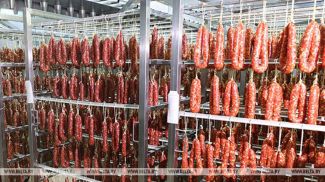
NESVIZH, 4 June (BelTA) – The heads of government of the EAEU member states signed a package of documents following the meeting of the Eurasian Intergovernmental Council in Nesvizh on 4 June, BelTA has learned.
Among the documents is the order “On the annual report of the Eurasian Economic Commission on the state of competition in cross-border markets and measures to prevent violations of general competition rules in 2023”. Chairman of the Board of the Eurasian Economic Commission Bakytzhan Sagintayev noted that appeals submitted to the EAEU by businesses concerned the construction sector, pharmaceutical production, chemical industry, food production and a number of other areas. As a result of these appeals, eight investigations were carried out, one warning was issued, and another 11 cases are under consideration.

The participants of the meeting approved the order “On the 2023 report “On the construction and development of transport infrastructure in the Eurasian Economic Union member states in the East-West and North-South directions, including within the framework of China's Belt and Road Initiative”.
“Currently, we prioritize 11 large-scale projects to build and repair roads and railways. This year, we continue implementing a comprehensive plan to develop Eurasian transport corridors and digitalizing rail freight transportation. Electronic documents are broadly used in transportation between our countries. Depending on the route, this figure can be up to 90%. For example, the share of paperless transportation between Kazakhstan and Russia has doubled,” said Bakytzhan Sagintayev.

Meanwhile, the EAEU embarked on a pilot project to introduce electronic customs transit along the Dostyk - Brest-North and Altynkol - Brest-North routes. The work on agreements to digitalize Russia-China rail freight transportation is on the homestretch.

Another order adopted on 4 June was titled “On monitoring the assessment of the regulatory impact of draft decisions of the Eurasian Economic Commission in 2023.” “We attach great importance to the development of the mechanism to assess the impact of EEC decisions on businesses. We provide prime ministers with regular updates on this work. Among the new things done by the EAEU this year was the introduction of a mechanism to assess the actual impact of decisions taken. Draft international treaties will become subject to assessment. Previously, only draft decisions of the EEC underwent the assessment of the regulatory impact on businesses. This will allow assessing the entire life cycle of regulatory activities in the union,” the chairman of the EEC Board explained.













